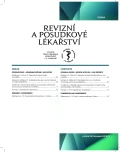-
Medical journals
- Career
Ergodiagnostics as a constituent of working and social rehabilitation
Authors: K. Svěcená 1,2; Petra Sládková 3
Authors‘ workplace: Klinika adiktologie 1. lékařské fakulty Univerzity Karlovy a Všeobecné fakultní nemocnice v Praze, vedoucí pracoviště prof. PhDr. Michal Miovský, Ph. D. 1; Fakulta zdravotnických studií Západočeské univerzity v Plzni, vedoucí Katedry rehabilitačních oborů Fakulty zdravotnických studií MUDr. Otto Kott, CSc. 2; Klinika rehabilitačního lékařství 1. lékařské fakulty Univerzity Karlovy a Všeobecné fakultní nemocnice v Praze, vedoucí pracoviště MUDr. Yvona Angerová, Ph. D., MBA 3
Published in: Reviz. posud. Lék., 22, 2019, č. 3, s. 64-70
Category: Original Articles, Review Articles, Case Reports
Overview
According to WHO, there are presently about 15% of population is affected by some kind of defects – disability. These individuals can be significantly assisted by rehabilitation, but it is not available for everyone, who need it. Within the process of rehabilitation, the inter-professional team take every effort to a maximal support of the patient for renew the affected functions as soon as possible, and consequently to improve the quality of the patient’s life. WHO (2006) defines rehabilitation as a collection of measures, directed to the fastest resocialization of individuals of health-affected individuals, those suffering from a disease or after an injury or inborn defect. In order to make the plan of resocialization possible, the individuals need to be incorporated in the working process, or supported in a way to make the individual capable of competition in the open labor market. Within this process ergo diagnostics, and its procedure is indispensable, i.e. examination of the functional potential of the individual. Prevocational evaluation in the Czech Republic has a long tradition, since unification of the ergo diagnostic methods first occurred within the EQUAL project and subsequently in the PREGNET project. In spite of the fact that both these projects accomplished a great deal of work, there is still a lot of work, since there are many inconsistencies to overcome in prevocational evaluation. In spite of that, the process is very important as a first step of rehabilitation and helps in effective integration of the individual into common life.
Keywords:
prevocational evaluation – labor potential – working rehabilitation – social rehabilitation
Sources
1. Čl. 1 ze dne 12. března 2010. Péče o pacienty s cerebrovaskulárním onemocněním v ČR. Věstník MZ ČR, 2010, částka 2.
2. Čl. 1 ze dne 4. prosince 2015. Cenový předpis Ministerstva zdravotnictví 1/2016/DZP ze dne 1. prosince 2015, o regulaci cen poskytovaných zdravotních služeb, stanovení maximálních cen zdravotních služeb poskytovaných zubními lékaři hrazených z veřejného zdravotního pojištění a specifických zdravotních výkonů. Věstník MZČR, 2015, částka 19.
3. Kahoun, V. et al. Sociální zabezpečení Vybrané kapitoly. Praha: Triron, 2009, s. 422. ISBN 978-80-7387-346-2.
4. Kee-hong, Ch., FIiszdon J. M., Morris B. D. Beyond Cognition: A Longitudinal Investigation of the Role of Motivation During a Vocational Rehabilitation Program. The Journal of Nervous and Mental Disease, 2013, 201(3), p. 173–178. doi: 10.1097/NMD.0b013e3182848bd4.
5. Musgrave, J. A. Model for Developing a Specialized Vocational Assessment Using O*NET Abilities Data Elements. VECAP Journal, 2011, 7(1).
6. San Bernardino Hagedorn, R. Ergotherapie: Theorien und Modelle; die Praxis begründen. Georg Thieme Verlag: Germany, 2000, s. 141. ISBN 978-3-13-125651-5.
7. Švestková, O. Praktická aplikace ICF u pacientů po traumatickém poranění mozku. XV. Sjezd Společnosti rehabilitační a fyzikální medicíny: Luhačovice, Česká republika, 16. červen 2008: sborník abstrakt. s. 47. ISBN 978-254-1238-1.
8. HASIM. Ergodiagnostika pomáhá lidem se zdravotním postižením. © 85. HASIM, [cit. 2018-0I-09]. Dostupné na www: www.hasim.cz/content/ergodiagnostika-pomaha-osobam-se-zdravotnim-postizenim.
9. Švestková, O. Svěcená, K. In: Kalvach, Z. et al. Křehký pacient a primární péče. Praha:Grada Publishing, 2011, s. 202–2012. ISBN 978-80-247-4026-3.
10. Švestková, O. Funkční diagnostika patofyziologických projevů u osob po traumatickém poranění mozku, jejich objektivizace a subjektivní hodnocení (s použítím Mezinárodní klasifikace funkčních schopností, disability a zdraví WHO). Praha, 2007. Habilitační práce. Univerzita Karlova, 1. lékařská fakulta.
11. Švestková, O. Neurorehabilitace. Ústřední vojenská nemocnice, Praha, 2013.
12. Švestková, O., Angerová, Y., Sládková, P. Mezinárodní klasifikace funkčních schopností, disability a zdraví (ICF): kvantitativní měření kapacity a výkonu. Česká a slovenská neurologie a neurochirurgie, 2009, 72(6), p. 580–586. ISSN 1210-7859.
13. Švestková, O., Angerová, Y., Sládková, P. Correlation between subjective nad objective parametres of the patients after TBI (using ICF and WHODASII). Brain Injury, Supplementum 1. 1. vyd. Lisabon: Lash & Associates Publishing/Training Inc., 2008. p. 113. ISBN 0-000-00000-0. ISSN 0269-9052.
14. Švestková, O. Svěcená, K. Ergoterapie. Skripta pro studenty bakalářského oboru. Praha: Univerzita Karlova, 1. lékařská fakulta, 2013. ISBN 978-80-260-4100-9.
15. WHO. Rehabilitation key facts. Ženeva: © WHO, [cit. 2013-10-09]. Dostupné na www: https://www.who.int/news-room/fact-sheets/detail/rehabilitation.
16. Zvoníková, A., Čeledová, L., Čevela, R. Základy posuzování invalidity. 1. vyd. Praha: Grada, 2010, 357 s. ISBN 978-802-4735-351.
17. WFOT. Definition of Occupational Therapy. wfot.org [online]. Australia: ©WFOT,2011 [cit. 2013-01-18]. Dostupné na www: http://www.wfot.org/AboutUs/AboutOccupationalTherapy/DefinitionofOccupationalTherapy.aspx.
Labels
Medical assessment Occupational medicine
Article was published inMedical Revision

2019 Issue 3
Most read in this issue- Idiopathic intestinal inflammations and invalidity
- Ergodiagnostics as a constituent of working and social rehabilitation
- Multiple sclerosis and assessment of health state, working ability and invalidity
- 51. Dni posudkového lekárstva
Login#ADS_BOTTOM_SCRIPTS#Forgotten passwordEnter the email address that you registered with. We will send you instructions on how to set a new password.
- Career

